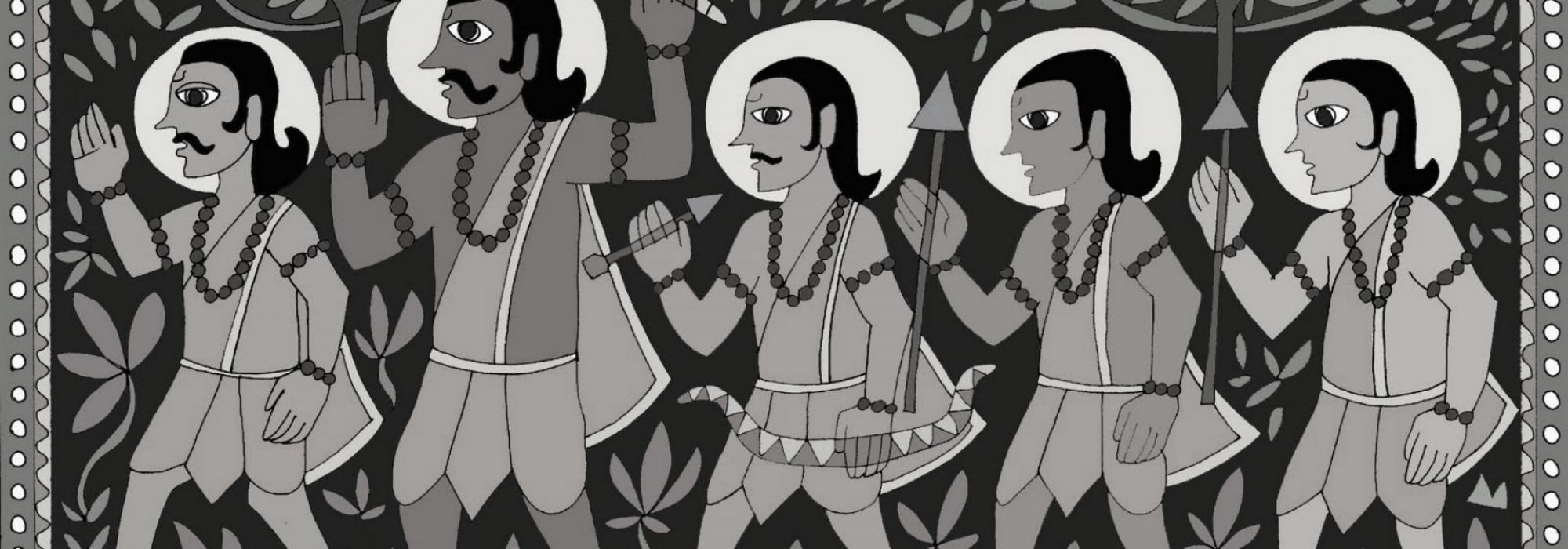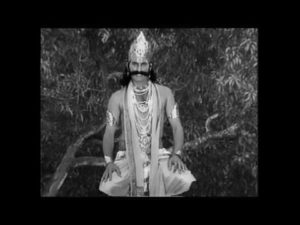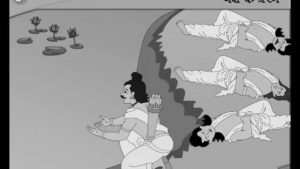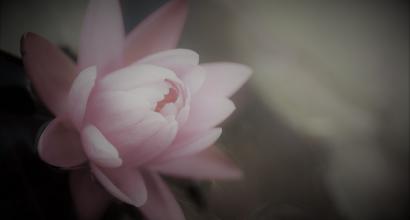The fourth part of this translation comprises the verses that are not found in the critical edition but are in the Chitrashala edition. Most of them are as elegant as the ones found in the critical edition. This episode appears in chapters 311-12 of the Chitrashala edition. The verses are not numbered so as to avoid confusion.
Yaksha
कोऽतिथिः सर्वभूतानां
किंस्विद्धर्मं सनातनम् ।
अमृतं किंस्विद्राजेन्द्र
किंस्वित्सर्वमिदं जगत् ॥
Who is the guest of all beings?
What is the eternal dharma?
What is amrita, O king of kings?
What is this universe?
Yudhishtira
अतिथिः सर्वभूतानाम्
अग्निः सोमो गवामृतम् ।
सनातनोऽमृतो धर्मो
वायुः सर्वमिदं जगत् ॥
Fire is the guest of all creatures
Milk of the cow is amrita
The immortal dharma is eternal
The universe is all air
Yaksha
किमर्थं ब्राह्मणो दानं
किमर्थं नटनर्तके ।
किमर्थं चैव भृत्येषु
किमर्थं चैव राजसु ॥
Why do we offer dana to brahmanas?
Why are donations given to actors and dancers?
Why do we offer dana to servants?
Why are donations made to kings?
Yudhishtira
धर्मार्थं ब्राह्मणे दानं
यशोऽर्थं नटनर्तके ।
भृत्येषु भरणार्थं वै
भयार्थं चैव राजसु ॥
We offer dana to brahmanas for the sake of dharma
One donates to actors and dancers for fame
We offer dana to servants for their nourishment
One donates to the king out of fear
Yaksha
केन स्विदावृतो लोकः
केन स्विन्न प्रकाशते ।
केन त्यजति मित्राणि
केन स्वर्गं न गच्छति ॥
With what is the world enveloped?
What doesn’t shine brightly?
Why are friends forsaken?
What stops one from going to heaven?
Yudhishtira
अज्ञानेनावृतो लोकः
तमसा न प्रकाशते ।
लोभात्त्यजति मित्राणि
सङ्गात्स्वर्गं न गच्छति ॥
The world is engulfed with ignorance
Darkness and lethargy don’t shine
Friends are forsaken due to greed
Earthly attachments make heaven unavailable.
Yaksha
तपः किंलक्षणं प्रोक्तं
को दमश्च प्रकीर्तितः ।
क्षमा च का परा प्रोक्ता
का च ह्रीः परिकीर्तिताः ॥
What is the nature of tapas?
What is true restraint?
What constitutes forgiveness?
What is modesty?
Yudhishtira
तपः स्वधर्मवर्तित्वं
मनसो दमनं दमः ।
क्षमा द्वन्द्वसहिष्णुत्वं
ह्रीरकार्यनिवर्तनम् ॥
Aligning to one’s true nature is tapas
The control of the mind is true restraint
Forbearance of dichotomy is forgiveness
Abstinence from unworthy acts is modesty
Yaksha
किं ज्ञानं प्रोच्यते राजन्
कः शमश्च प्रकीर्तितः ।
दया च का परा प्रोक्ता
किञ्चार्जवमुदाहृतम् ॥
What is knowledge, O king?
What is tranquility?
What constitutes kindness?
What is said to be integrity?
Yudhishtira
ज्ञानं तत्त्वार्थसंबोधः
शमश्चित्तप्रशान्तता ।
दया सर्वसुखैषित्वम्
आर्जवं समचित्तता ॥
Understanding the essence of the fundamentals is knowledge
Peace of mind is tranquility
Concern for the well-being of all is compassion
Integrity is equanimity of the heart
Yaksha
कः शत्रुर्दुर्जयः पुंसां
कश्च व्याधिरनन्तकः ।
कीदृशश्च स्मृतः साधुः
असाधुः कीदृशः स्मृतः ॥
Which is the invincible enemy?
What constitutes an eternal malady?
What sort of a man is noble?
What sort of a man is ignoble?
Yudhishtira
क्रोधः सुदुर्जयः शत्रुः
लोभो व्याधिरनन्तकः ।
सर्वभूतहितः साधुः
असाधुर्निर्दयः स्मृतः ॥
Anger is the invincible enemy
Greed is an incurable disease
One who desires the well-being of all creatures is noble
One who is without mercy is ignoble
Yaksha
को मोहः प्रोच्यते राजन्
कश्च मानः प्रकीर्तितः ।
किमालस्यं च विज्ञेयं
कश्च शोकः प्रकीर्तितः ॥
What is understood by attachment, O king?
What is self-pride?
What is understood by laziness?
What is sorrow?
Yudhishtira
मोहो हि धर्ममूढत्वं
मानस्त्वात्माभिमानिता ।
धर्मनिष्क्रियताऽलस्यं
शोकस्त्वज्ञानमुच्यते ॥
Not knowing dharma leads to attachment
Pride is the arrogance of being someone
Abandoning dharma is laziness
Ignorance is sorrow
Yaksha
किं स्थैर्यमृषिभिः प्रोक्तं
किं च धैर्यमुदाहृतम् ।
स्नानं च किं परं प्रोक्तं
दानं च किमिहोच्यते ॥
What do the rishis call as steadiness?
How do they describe courage?
What is the supreme bath?
What is the meaning of dana?
Yudhishtira
स्वधर्मे स्थिरता स्थैर्यं
धैर्यमिन्द्रियनिग्रहः ।
स्नानं मनोमलत्यागो
दानं वै भूतरक्षणम् ॥
Steadiness is being firmly aligned to one’s true nature
Courage is the control of the senses
The supreme bath is cleansing the mind of impurities
Protecting all beings is truly dana
Yaksha
कः पण्डितः पुमान्ज्ञेयो
नास्तिकः कश्च उच्यते ।
को मूर्खः कश्च कामः स्यात्
को मत्सर इति स्मृतः ॥
Who should be regarded as a pandita?
Who is an atheist?
Who is a fool? What is regarded as desire?
What is said to be jealousy?
Yudhishtira
धर्मज्ञः पण्डितो ज्ञेयो
नास्तिको मूर्ख उच्यते ।
कामः संसारहेतुश्च
हृत्तापो मत्सरः स्मृतः ॥
One who knows dharma is a pandita
An atheist is also a fool
Desire is that which arises from samsara
Grief of the heart is known as jealousy
Yaksha
कोऽहङ्कार इति प्रोक्तः
कश्च दंभः प्रकीर्तितः ।
किं तद्दैवं परं प्रोक्तं
किं तत्पैशुन्यमुच्यते ॥
What is arrogance?
What is hypocrisy?
What is the eternal destiny?
What is slander?
Yudhishtira
महाज्ञानमहङ्कारो
दम्भो धर्मो ध्वजोच्छ्रयः ।
दैवं दानफलं प्रोक्तं
पैशुन्यं परदूषणम् ॥
Great ignorance is arrogance
Using dharma merely as an insignia is hypocrisy
The fruit of our dana is our destiny
Speaking ill of others is slander
Yaksha
धर्मश्चार्थश्च कामश्च
परस्परविरोधिनः ।
एषां नित्यविरुद्धानां
कथमेकत्र सङ्गमः ॥
Dharma, artha, and kama
are opposed to one another
How can these mutually contradictory things
be united together at one place?
Yudhishtira
यदा धर्मश्च भार्या च
परस्परवशानुगौ ।
तदा धर्मार्थकामानां
त्रयाणामपि सङ्गमः ॥
When one’s wife and one’s dharma
agree with each other,
the three contradictory goals
may co-exist
Yaksha
अक्षयो नरकः केन
प्राप्यते भरतर्षभ ।
एतन्मे पृच्छतः प्रश्नं
तच्छीघ्रं वक्तुमर्हसि ॥
Who is he, O best of Bharatas,
that is condemned to unending hell?
You are worthy to answer
my question immediately
Yudhishtira
ब्राह्मणं स्वयमाहूय
याचमानमकिञ्चनम् ।
पश्चान्नस्तीति यो ब्रूयात्
सोऽक्षयं नरकं व्रजेत् ॥
He that summons a brahmana
promising alms, then changes his mind
and declares that he has nothing to offer,
goes to unending hell
वेदेषु धर्मशास्त्रेषु
मिथ्या यो वै द्विजातिषु ।
देवेषु पितृधर्मेषु
सोऽक्षयं नरकं व्रजेत् ॥
He who decries as false –
the Vedas, the Dharmashastras,
dvijas, deities, ancestors –
goes to unending hell
विद्यमाने धने लोभात्
दानभोगविवर्जितः ।
पश्चान्नास्तीति यो ब्रूयात्
सोऽक्षयं नरकं व्रजेत् ॥
Though having wealth,
if out of greed,
one neither donates nor enjoys it,
he goes to unending hell.
Yaksha
राजन्कुलेन वृत्तेन
स्वाध्यायेन श्रुतेन वा ।
ब्राह्मण्यं केन भवति
प्रब्रूह्येतत् सुनिश्चितम् ॥
Tell me for certain, O king:
How does one become a brahmana?
Is it by birth, by conduct and character,
by study of scriptures, or by his learning?
Yudhishtira
श्रुणु यक्ष कुलं तात
न स्वाध्यायो न च श्रुतम् ।
कारणं हि द्विजत्वे च
वृत्तमेव न संशयः ॥
Listen O Yaksha, neither by clan nor by father
nor by study of scriptures, nor by learning
A person becomes a brahmana
only by conduct and character, without doubt
वृत्तं यत्नेन संरक्ष्यं
ब्राह्मणेन विशेषतः ।
अक्षीणवृत्तो न क्षीणो
वृत्ततस्तु हतो हतः ॥
One must protect his character
if he wishes to be worthy of being called a brahmana
He is not injured if his conduct remains unimpaired
He is killed if his character is killed
पठकाः पाठकाश्चैव
ये चान्ये शास्त्रचिन्तकाः ।
सर्वे व्यसनिनो मूर्खा
यः क्रियावान् स पण्डितः ॥
Teachers and students
and others who studies the texts
are all fools if they are addicted to vices
A pandita is one who toils on the right path
चतुर्वेदोऽपि दुर्वृत्तः
स शूद्रादतिरिच्यते ।
योऽग्निहोत्रपरो दान्तः
स ब्राह्मण इति स्मृतः ॥
One who has read the four Vedas
but is of bad character – he is regarded as a shudra
One who performs the Agnihotra and is restrained
is indeed a brahmana
Yaksha
प्रियवचनवादी किं लभते
विमृशितकार्यकरः किं लभते ।
बहुमित्रकरः किं लभते
धर्मे रतः किं लभते कथय ॥
What does one gain by pleasant speech?
What does one gain by acting with judgement?
What does one gain by having many friends?
What does one gain by being devoted to dharma?
Yudhishtira
प्रियवचनवादी प्रियो भवति
विमृशितकार्यकरोऽधिकं जयति ।
बहुमित्रकरः सुखं वसते
यश्च धर्मरतः स गतिं लभते ॥
One who speaks pleasant words is dear to everybody
One who acts with sagacity gains more
One who has many friends lives in sukha
One who is devoted to dharma obtains the ultimate refuge
Yaksha
को मोदते किमाश्चर्यं
कः पन्थाः का च वार्तिका ।
वद मे चतुरः प्रश्नान्
मृता जीवन्तु बान्धवाः ॥
Who is happy? What is the greatest wonder?
Which is the real path? What is the news?
Answer these four questions of mine
and let your brothers come alive
Yudhishtira
पञ्चमेऽहनि षष्ठे वा
शकं पचति स्वे गृहे ।
अनृणी चाप्रवासी च
स वारिचर मोदते ॥
On the fifth or sixth part of the day
one who cooks a simple meal in his home,
one who has no debts nor the desire to leave his home –
he is happy, O aquatic being!
अहन्यहनि भूतानि
गच्छन्तीह यमालयम् ।
शेषाः स्थावरमिच्छन्ति
किमाश्चर्यमतः परम् ॥
Day after day, countless beings
are going to the abode of death
Those that remain desire to be immortal
What can be a greater wonder than that?
तर्कोऽप्रतिष्ठः श्रुतयो विभिन्ना
नैको ऋषिर्यस्य मतं प्रमाणम् ।
धर्मस्य तत्त्वं निहितं गुहायां
महाजनो येन गतः स पन्थाः ॥
Arguments are inconclusive; the scriptures hold varied views,
there’s not a single rishi whose words can be taken as pramana,
the truth about dharma is hidden in darkness
The path trod by great men is the true path
अस्मिन् महामोहमये कटाहे
सूर्याग्निना रात्रिदिवेन्धनेन ।
मासर्तुदर्वीपरिघट्टनेन
भूतानि कालः पचतीति वार्ता ॥
The deluded world is like a pan
The sun is the fire, day and night are the fuel
Months and seasons are the wooden ladles
Time cooks all beings in the pan – this is the news!

















































